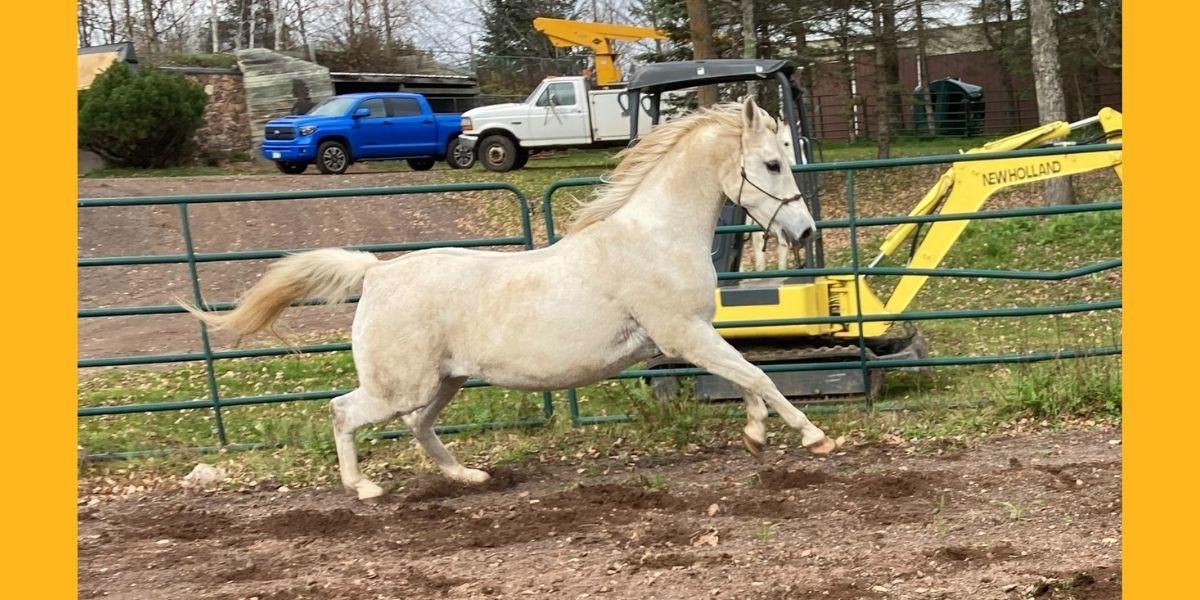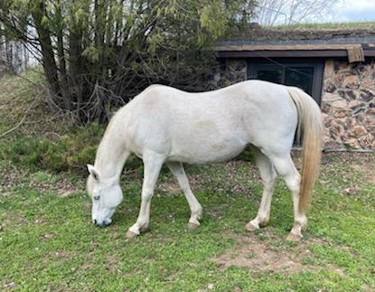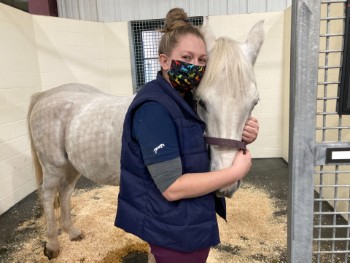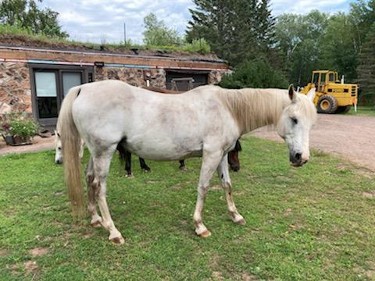Overcoming complications
Duo of medical emergencies put the survival of a horse named Tier to the test

Duo of medical emergencies put the survival of a horse named Tier to the test
Tier, a 15-year-old Arabian gelding, runs at his home near Duluth, Minn. Photo courtesy of Sandy Cooke.
Sandy Cooke and her 15-year-old Arabian gelding Tier have spent many hours traversing the countryside near their home outside Duluth, Minn. But when Tier experienced a medical emergency last year, the pair found themselves riding a rollercoaster instead of their usual trails.
It all started when Tier had an episode of choke back in May 2021. Quickly treating choke, also known as a blockage in a horse’s esophagus, is critical and Cooke knew she needed to have Tier seen by a veterinarian as soon as possible.
Her usual veterinarian, Dr. Jamie Meagher, relieved most but not all of the blockage and recommended Cooke and Tier make the more than two-hour trip from Duluth to the Twin Cities for additional treatment. Once they arrived at a veterinary practice in Anoka, Cooke was told the choke had resolved itself.

The pair returned home with some medications, but it wasn’t long before Cooke knew something still wasn’t right with Tier. He was lethargic, had lost weight, and was breathing harder than usual.
“Two days after that, I had to have my vet back up. I knew there was something wrong with him,” Cooke says. “She came up and listened to him and she said, ‘He's bad. Take him to the University this time.’”
And so, Cooke and Tier headed back down to the Twin Cities, this time to Piper Equine Hospital at the Univesity of Minnesota College of Veterinary Medicine. Their arrival kicked off an eight-day hospital stay for Tier followed by five months of treatment and recovery.
“While Tier was quiet and alert when he came in and generally seemed fairly comfortable, listening to his lungs showed significant harsh sounds on both sides and absent sounds in the area consistent with aspiration pneumonia,” says Dr. Zoe Inglis, a large animal resident who helped care for Tier under the advisement several senior clinicians.

Aspiration pneumonia is a lung infection caused by inhaling foreign material and can be a complication of choke because feed and salvia can enter the lungs when the esophagus is obstructed. Aspiration pneumonia has a high fatality rate in horses, so it was imperative to treat Tier immediately.
His care team placed him on antibiotic therapy and medication to help regulate his breathing. Tier’s case was severe, but Inglis says his bright personality helped carry him through his hospital stay. Once at home, Tier continued to see improvement, with Cooke diligently giving him his medication around the clock.
“I was very conscientious about giving him his medicine three times a day. I got up at midnight and gave it to him,” Cooke says. “I don't believe I ever missed a day.”
The effort did not go unnoticed by Tier’s care team, who observed the horse making steady progress at each follow-up appointment over the next several months.

“This case is a really great testament to how repeated rechecks and strict adherence to recommendations of medications and management can get horses through conditions that, realistically, could be the end of their career or their lives,” Inglis says.
Since his last follow-up appointment in October 2021, Tier is back to riding the trails and prancing around the pasture. Cooke is incredibly grateful to Tier’s care team to have her companion back.
“They were very good about everything down there, and I was very happy with them,” she says.